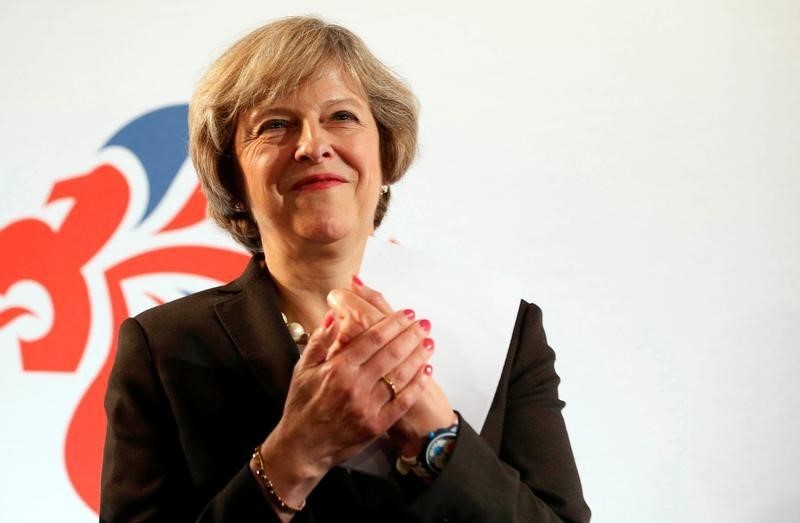By Elizabeth Piper
BRUSSELS (Reuters) - Prime Minister Theresa May will tell European Union leaders on Thursday it is time to start talking about future EU ties with Britain and put paid to suggestions her government might reconsider Brexit.
A source in May's office said the prime minister would use a dinner at an EU summit in Brussels, her first since she was appointed premier following Britain's June 23 vote to exit the bloc, to outline her approach to the other 27 leaders.
Hoping to dispel any thoughts that Britain could hold a second referendum to reverse its decision to leave, May will call on leaders to help her make the country's departure as smooth as possible, to calm financial markets and business over a divorce process she says she will trigger by the end of March.
"I expect her to say in broad terms that the British people have made a decision, and it's right and proper that that decision is honoured," the source said May would tell the other leaders after a dinner discussion devoted to Russia - the only time set aside to discuss Brexit at the summit in Brussels.
"There will be no second referendum. The priority now has got to be looking to the future and the relationship between the UK and the EU, both as an organisation but also (with) the member states of the EU once we leave."
After promising to listen to the voices of millions of Britons who voted to leave because of concerns over high levels of immigration and a desire to wrest back control they believe has been ceded to the EU, May is keen to win the country the "best possible deal" by coaxing an angry EU into starting talks.
But her suggestion that Britain could head for a clean break with the EU and its single market of 500 million consumers if the bloc fails to compromise has done more to unite leaders in their refusal to offer a deal that might encourage others to follow suit.
EU officials have repeatedly said Britain cannot restrict immigration and be a member of the single market, ruling out allowing London to "cherry pick" the best parts of their union.
But despite frustration in European capitals, one senior EU diplomat said everything would be "very polite" at the summit which will also discuss the migration problem, EU trade deals and Russia's role in the Syria crisis:
"Mrs. May is a very methodical, very steady person," he said. "There can't be any debate that would seem like a pre-negotiation, the time isn't ripe for that. It's not what May plans - she's still weighing up options in the UK and needs time."
A SOFTER SIDE
After shoring up unity among her ruling Conservative Party earlier this month by committing to triggering Article 50 of the EU's Lisbon Treaty by the end of March, the formal procedure for exiting the EU, May is keen to show a more pragmatic side.
She will suggest that EU leaders "can get on with your lives" after Britain, often an awkward member of the bloc, leaves, a senior British official said.
But the British source said May would be clear that she did not want to lose the "breadth and depth" of a relationship grown over 40 years.
"We have been clear throughout ... the member states of the EU have a strong relationship with the UK on a whole range of issues. We are very close economic and trading partners and we all want that to continue," the British source said.
"We want our departure to be a smooth, constructive, orderly process, minimising uncertainty for countries, for people and our businesses and that we want to build a future partnership that cements Britain as a close ... partner for the EU."
May, who campaigned, albeit quietly, to remain in the bloc, will seek to dispel any hopes that Brexit can be stopped after European Council President Donald Tusk said Britain may decide not to leave as it will lose trade and other benefits.
May, whose commitment to reducing immigration into Britain stems from her six years as the country's interior minister, is clear that she will deliver Brexit, setting a very different tone from her predecessor, David Cameron, who won a deal to reform Britain's ties with the EU but lost the referendum.
Several eurosceptics in the ruling Conservative Party criticised Cameron for failing to convince the EU that Britain might leave during his renegotiation earlier this year.
"You can make comparisons to her predecessor but the prime minister is approaching this European Council in a different context and a different time. She is the prime minister that is going to be taking the UK out of the EU," the source said.

"We are realistic and honest about the scale of the challenge, the complexity of the task ahead and the fact of course there will be moments when there are differences ... We all need now to be focusing on the future."